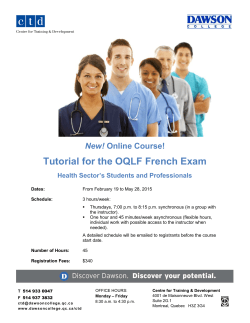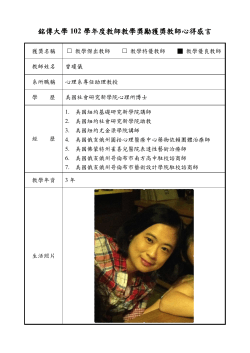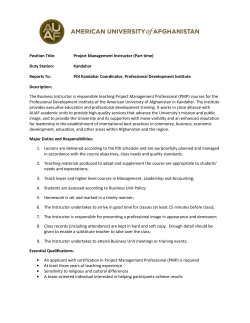
AUT 280-301 Automotive Air Conditioning Systems
Course Syllabus AUT 280 Spring 2015 Automotive Air Conditioning Systems Automotive Technology Department College of Applied Sciences and Arts Southern Illinois University Carbondale Instructor: Eugene Talley Office: 140C Phone: (618) 453-9132 Email: etalley@siu.edu Class Calendar Meeting Time: 1:00-4:50 PM April 6-May 8 Mon, Tues, Thurs, Fri. (Wed. by arrangement) Class Location Laboratory: TEC 0137 (Lab-1) Classroom: TEC 0134 Final Exam May 8, 2015 Prerequisite AUT170 Office Hours M, T, Th, F 10:00 AM-12:00PM or by appointment Course Description: A study of refrigeration systems, temperature controls, and automotive HVAC vacuum/electrical circuits. Emphasis placed on environmental impact of refrigerants, environmentally safe refrigerant technology and applicable legislation. Laboratory experiences provide the opportunity to study the use of air conditioning system diagnostic tools, refrigerant recovery/recycling equipment, and diagnostic and repair services. Course Objectives: This course will provide the student with the opportunity to: 1. identify the major components of the refrigeration system. 2. understand the refrigerant cycle. 3. perform refrigerant recovery, recycling, and recharging. 4. diagnose refrigeration and HVAC system problems 5. perform HVAC service procedures. Course Topics/Units of Study Principles of Refrigeration and Effects on the Environment Operation and Diagnosis of Refrigeration Components Operation of Refrigerant Service and Testing Equipment Air Conditioning System Maintenance/Service Operation and Diagnosis of HVAC Controls Approved Retrofitting Procedure 08/2012 ERT Required Student Materials 1. Textbook: Automotive Heating and Air Conditioning, 7th Edition, James Halderman, Prentice Hall Publishing 2. Multimedia CD for above Textbook 3. A three (3) ring binder. 2.0 inch. 4. Toolbox with tools as per listed for enrollment into the automotive program. (A list may be obtained at the administration office.) 5. Safety glasses. 6. Recommended: pocket calculator, jump drive, jumper lead set, and inspection light. SAFETY GLASSES ARE MANDATORY. IF FOUND WITHOUT YOUR SAFETY GLASSES YOU WILL RECEIVE ONE WARNING BEFORE BEING ASKED TO LEAVE! Grading and Testing Grading Scale: The student’s grade is determined from lab activities, written tests, performance tests, assignments, participation, and attendance. The overall grade can be influenced positively and negatively by their lab activities, attendance, participation, and enthusiasm. The percentage breakdown is as follows: A = 93% to 100% B = 85% to 92.9% C = 76% to 84.9% D = 70% to 75.9% F = 69.9% and Lower It is expected that grades in this course will follow the normal probability distribution curve. Grades will most likely be concentrated near the center and decrease in frequency towards either end. The total points a student earns at the end of the class divided by the total points possible will present a percentage score. Any deductions to this percentage score for participation, punctuality and/or attendance will then be taken to determine the student’s final percentage. This percentage will be referenced to the Department’s scholastic grading scale to determine the student’s final grade. An INC is assigned when, for reasons beyond their control, students engaged in passing work are unable to complete all class assignments. Refer to the SIU University Policy on ‘Incomplete’ as a course grade in the SIUC Undergraduate Catalog, Chapter 2 Section: Grading and Scholastic Regulations. A WF is may be assigned if a student does not drop the course, but merely discontinues attendance. It is the Student’s responsibility to complete the drop/withdrawal process. Refer to the SIU University Policy on ‘WITHDRAWAL’ from a course SIUC Undergraduate Catalog, Chapter 2, Section: Advisement, Registration, Withdrawal. Withdrawal/Drop dates can be obtained from a student’s SalukiNet account or from the department academic advisor. Page 2 Attendance: Attendance is a required portion of all SIUC Automotive courses. Quality instruction depends upon active student participation in the learning environment. Classes may not be missed without substantially affecting the ability of the student to master the course material. Each student is an integral part of the class as they share their experience, knowledge and impressions with the class in discussion. When a student misses class, it affects the entire class. For these and several other reasons, each unexcused absence could lower a student’s total score 2.5 percentage points. If a student is not present when roll is taken for each session, he or she is considered absent. It is the students’ responsibility to notify the instructor if they enter the class after attendance is taken. Students unable to attend class should notify the instructor as soon as possible and arrange with a classmate to obtain notes. Following an absence, the student should contact the instructor to obtain any possible handout materials and assignments. Punctuality: Class will begin promptly at the assigned time. Student entering after class has begun inevitably disrupt the rest of the students. Students entering late may miss special announcements, notes, and class or assignment changes. For these reasons, a student being tardy 3 times will equal 1 absence in lowering a student’s score. Lab: The laboratory component of this class is significant and all students are expected to participate fully during these times. Laboratory work will consist of specific assignments, instructor assigned work, which may include vehicles from the general public. Students will gain useful experience reinforcing the theory taught in the classroom. Lab work must be performed in a timely manor to maximize the benefit to the student. Laboratory work should include; refrigerant services, leak repairs, component services and air-management system repair. Students will be expected to observe all program and shop regulations and participate in maintaining a clean and safe work environment. The Lab Activities, which involve completing worksheets while performing various assembly, disassembly and performance of activities will be graded for thoroughness. 30 lab sheets are expected to be completed during the available lab time in class. Lab Participation: Each student will be evaluated for lab participation during the course. This evaluation is based on the instructor’s evaluation and observation of a student’s performance in 5 areas. Some examples are listed, but not limited to what is listed. 1. Equipped for class: this includes WEARING safety glasses in the labs 2. On-time and on-task: does not abuse break times or cell phone use (as examples) 3. Professionalism: this can include working and interacting with others 4. Work Quality: follows procedures, treatment of vehicles, working on your own 5. Clean up: Keeping your work area clean and returns borrowed tools to proper location Page 3 Homework: Homework includes assignments from the textbook and the lab worksheets. Any homework turned in 1 day late will result in a 50% loss of points. No credit will be given for assignments not turned in after 2 days. Written Tests: The written tests and quizzes will be ASE style questions over topics covered in lecture, lab demonstrations, handouts, and the book. Expect a quiz/test approximately every 5 class days. Quizzes will be at the instructor’s discretion. Make up tests and quizzes will only be allowed with a doctor’s note, or an agreement with the instructor in advance of an absence. The test or quiz must be made up within 2 days of the absence. Refrigerant Licensure: Federal law requires professional technicians to be certified in the handling of refrigerants. You will be provided a booklet containing the refrigerant information and quiz. The quiz will be given in class and you MUST pass this quiz in order to complete this course. If you would like to obtain your license it is your responsibility to mail in the nominal fee ($15) to obtain your license. The quizzes are also available online at www.ase.com or www.macsw.org Preparedness and participation: Students are expected to come to class prepared and actively participate in discussions of relevant topics. Students are encouraged to bring items of interest relevant to current topics and events affecting the automotive industry to share in the class discussion. A student sleeping or otherwise disrupting class affects the entire class and their learning. These actions are considered non-participatory and will result in the same effect as that of an absence. If any of these occur, the instructor may ask the student to leave the class. Electronic devices: It is Department policy that cell phones are not to be used during class time. Please practice professional courtesy in utilizing electronic devices during class periods. Cell phones should not disrupt classmates. Many cell phones have an aggressive vibrate feature and will still often times disrupt other students. Cell phones should be either shut off, placed on silent, or not taken into class. Starting up and shutting down of computers during class sessions can disrupt others. If a student wishes to use a computer during class, shut off all sounds, have it powered up prior to class beginning, and shut it down after class has completed. It is expected that those utilizing electronic devices during class time will restrict their use to current class discussion and activities. Playing computer games, watching videos, and general internet web browsing during class shows a student’s lack of attention to class topics and are disruptive and distracting to other classmates. For these reasons, this disruptive action is considered non-participatory and will result in the same effect as that of an absence. Any use of electronic devices for quizzes and exams must first be approved by the instructor. Page 4 Attire and conduct: Class attire and conduct are based on the Automotive Technology department Guidelines and should reflect the students respect to themselves, their peers, our customers, our industry and Southern Illinois University Carbondale. Internet instruction site: This course utilizes an instructor developed SIU Online site to enhance instruction. Students will be expected to complete required readings of articles posted to this site and be prepared to discuss them in class. In addition, there is a resource area for students to gather industry related reference information. All instructor presentations and assignments will be posted to this site for student reference. Confidential and sensitive material/information: It is understood that students in this class may be provided and/or exposed to confidential and sensitive corporate/business material and/or information. Any such material/information is intended to be used solely for the individual student’s educational purposes in this course. By attending this course, the student is hereby agreeing that they will not share and/or distribute such confidential and/or sensitive material and/or information with any party or entity outside of this immediate class in any manner and for any reason. Failure to do so can be considered non-participatory for the entire semester. Emergency and safety instructions: While in any automotive laboratory, students must follow safe laboratory practices at all times. This includes the wearing of appropriate eye protection while in the laboratory setting as well as proper operation of vehicles, equipment and tools. Students are to ask their instructor if for any reason they are unsure of proper operational procedures or appropriate safety precautions to take. SIU is committed to providing a safe and healthy environment for study and work. Because some health and safety circumstances are beyond our control, we ask that you become familiar with the SIU emergency Response Plan and Building Emergency Response Team (BERT) program. Emergency response information is available in the posters in every building on campus and in the Emergency Response Guideline pamphlet. It is also available on BERT’s website at http://www.bert.siu.edu/ and on the Department of Safety’s website www.dps.siu.edu. Instructors will provide guidance and direction to students in the classroom in the event of an emergency affecting your location. It is important that you follow these instructions and stay with your instructor during an evacuation or sheltering emergency. The Building Emergency Response Team will provide assistance to your instructor in evacuating the building or sheltering within the facility. Academic honesty policy/plagiarism: Students may be subject to disciplinary proceedings resulting in an academic penalty or disciplinary penalty for academic dishonesty. Academic dishonesty includes, but is not limited to, cheating on a test, plagiarism, or collusion. For additional information see the Morris Library Guide (http://libguides.lib.siu.edu/plagiarism) Page 5 Statement on inclusive excellence: SIU contains people from all walks of life, from many different cultures and sub-cultures, and representing all strata of society, nationalities, ethnicities, lifestyles, and affiliations. Learning from and working with people who differ from you is an important part of your education in this class, as well an essential preparation for any career.\ Supplementary assistance: With the cooperation of SIU’s Disability Support Services (DSS), each student who qualifies for reasonable supplementary assistance has the right to receive it. Students requesting supplementary assistance must first register with DSS in Woody Hall B-150, (453-5738) or http://disabilityservices.siu.edu Notice: If you have any type of special need(s) or disability for which you require accommodations to promote your learning in this class, please contact me as soon as possible. The Office of Disability Support Services (DDS) offers various support services and can help you with special accommodations. You may wish to contact DDS at 453-5738 or go to Room 150 at Woody Hall to verify your eligibility and options for accommodations related to your special need(s) or disability. SIU email policy Official SIU Student Email Policy: http://policies.siu.edu/policies/email.htm SIU Student Conduct Code: http://policies.siu.edu/documents/StudentConductCodeFINALMay32011.pdf Saluki cares: The purpose of Saluki Cares is to develop, facilitate and coordinate a university-wide program of care and support for students in any type of distress—physical, emotional, financial, or personal. By working closely with faculty, staff, students and their families, SIU will continue to display a culture of care and demonstrate to our students and their families that they are an important part of the community. To make a referral to Saluki Cares click, call, or send: http://salukicares.siu.edu/index.html ; (618) 453-5714, or siucares@siu.edu . IN CASE OF AN EMERGENCY IN THE LAB: Dial 911 and provide: Nature of emergency Victim’s condition Location of emergency Building #545 North Airport Drive, Murphysboro IL Page 6
© Copyright 2025
















